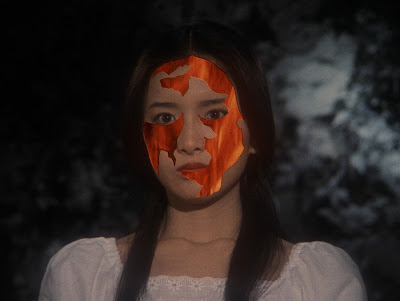
When Japanese movie studio Toho asked Obayashi Nobuhiko to give them something like Jaws (1975), Obayashi asked his 10-year-old daughter Chigumi for advice. She thought all Japanese movies were boring, so her dad urged her to offer a remedy. The ball got rolling with Chigumi’s assertion that it would be pretty freaky if her reflection in the mirror attacked her. “I always discuss important matters with the children,” Obayashi claims, and Hausu (77), the product of this collaboration, indeed represents an exceedingly rare marriage of cross-generational sensibilities. It’s a fantasy film as seen from the perspective of a child, yet it’s imbued with the larger mythological-psychotronic-experimentalist scope of an adult with a background in advertising. It’s aggressively playful, enamored with optical tricks and with soundscapes and repeated musical themes that seem culled from Godard and blaxploitation. It’s oblivious to generic orientation—okay, it’s oblivious to many forms of orientation, yet it also has a perfectly coherent narrative through-line with roots in the Western Gothic tradition, Japanese ghost stories, and Hansel and Gretel. You could call it a cautionary tale, but then you’d just have to look out for everything. Especially cats. And watermelons.



Hausu is the Japanese appropriation of the English word House. The former sounds vaguely more menacing to me, maybe because of that extra syllable, maybe because of the pleasing weirdness of hearing a familiar word mispronounced, but Criterion has emblazoned their terrific new DVD and Blu-ray packages with the latter term, perhaps in the hope that potential viewers will intuit that, as David Lynch once said, there’s just something inherently scary about a house. Whatever you want to call it, Obayashi’s fevered debut feature follows seven teenage girls with seven smurfy names as they travel to the countryside for their summer vacation and wind up at the house of a wheelchair-bound spinster. Before they arrive, the sky is always glowing warm and soft like some hazy dream you can’t pull away from, perhaps built on crude memories of Technicolor musicals. Once they’re installed in the titular dwelling, the world turns crepuscular and shadowy, and malice becomes boundless. Futons and pianos eat people. Cats’ eyes shimmer as though sending cryptic signals from the abyss. Heads emerge from wells and bite asses. Everything is deadly, yet these girls just wanna have fun. Dismemberment is scary, but who said death can’t be like ice cream? The realm of Hausu is one of relentless colour and geometrical flourish, the screen always being divided by walls, doors, corners, irises, and literal fissures in the filmic image that remind you of how very dry and adult Peter Greenaway’s formal noodling can be. It’s a realm of trapdoors and illusion, of cornball effects executed with verve, of preposterous panty-clad derring-do, of music and morbid delight, a realm where every childish suspicion about adults is wholly confirmed and then some. Western audiences may struggle to interpret this perverse, seemingly contradictory mash-up of fear and frolicking as something terribly exotic and coded in the Japanese culture, but you could also just think of it as a far more imaginative version of this thing we call Halloween.



Generously included in Criterion’s package and equally worth checking out is Emotion (66) Obayashi’s 40-minute piece about a girl from the seaside who travels far from home, makes a friend, and enters a secret world of sadomasochistic romance. A love triangle emerges, and parents are again not to be trusted. There’s no synch-sound, so the great American-born Japanese film scholar Donald Richie provides the English narration, which often seems slightly different in meaning from the Japanese narration, for which we’re given subtitles. Never one to use a stylistic trope once if he can use it 50 times, Obayashi is crazy for flash-cuts here, and is surely even more deeply under the spell of Godard in this use of on-screen text and his determination to push continuity to its outer limits while maintaining the minimum requirements for a forward-moving story. And there’s dancing! The images are often beautiful, and yes, fraught with dizzy emotion. At one point a title card appears that reads: NOW THE STORY DESCENDS INTO A RUINOUS ABYSS WITH VIOLENT MUSIC, which doesn’t exactly signal a radical shift in tone. There’s also a dream sequence that’s only marginally more bizarre than the rest of the movie. Like Hausu, it’s all kind of exhausting, but this sort of blind and wild adventure is bound to wear anyone out, so think of it as a work-out, and watch it before bed. Your brain will rest better afterwards.

No comments:
Post a Comment